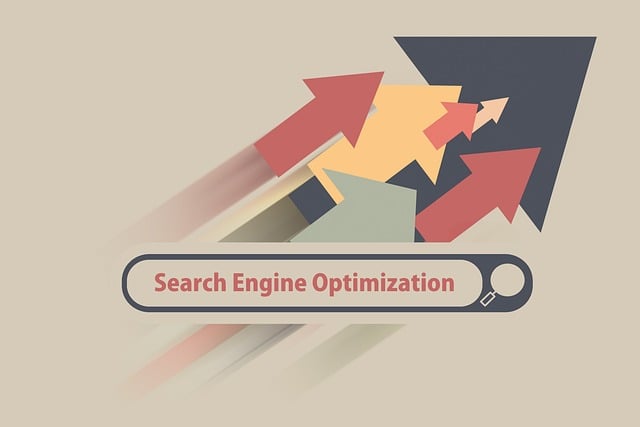In today's digital landscape, data-driven SEO is essential for boosting online visibility. By leveraging analytics and structured data, websites can provide search engines with valuable insights about their content, making it easier for users to find relevant information. This strategy significantly improves SEO rankings as search algorithms prioritize informative content that matches user queries, leading to increased organic traffic and a stronger online presence. Key metrics like organic traffic, bounce rates, average session duration, keyword rankings, click-through rates (CTRs), and pages per session should be closely monitored. Effective data-driven SEO strategies involve keyword research, on-page optimization, technical SEO optimizations, and building high-quality backlinks. Continuous monitoring and refinement are crucial for sustained improvement in SEO rankings.
In today’s digital landscape, data-driven SEO is revolutionizing how we improve SEO rankings. This strategic approach leverages analytics and keyword research to provide actionable insights that enhance search visibility. By understanding key metrics and implementing technical optimizations, websites can climb the ranks organically. Continuous monitoring and refinement are vital to staying ahead of algorithm changes. Utilizing high-quality backlinks and on-page optimizations further solidifies your online presence, ensuring long-term success in driving organic traffic and improving SEO rankings.
Understanding Data-Driven SEO and Its Impact on Rankings

In today’s digital landscape, understanding data-driven SEO is paramount for anyone aiming to improve SEO rankings. This approach leverages structured data and analytics to provide search engines with a comprehensive view of a website’s content, context, and value. By integrating this data into their algorithms, search engines can better match users’ queries with relevant results, ultimately enhancing the overall search experience.
The impact of data-driven SEO on rankings is significant. Websites that employ this strategy often see boosts in visibility and organic traffic as search engines prioritize content that’s both informative and aligned with user intent. This method allows businesses to compete effectively in crowded markets by showcasing their products or services in a more compelling light, ultimately driving better results and a stronger online presence.
The Role of Analytics in Identifying Ranking Opportunities

Analytics plays a pivotal role in identifying ranking opportunities for improving SEO rankings. By analyzing website traffic data, businesses can uncover valuable insights into user behavior and preferences. This includes understanding which keywords drive the most organic traffic, how users interact with different pages, and where they exit the site. Such insights empower marketers to optimize content and structure for better search engine visibility.
Through advanced analytics tools, patterns in user engagement can be detected, highlighting areas of strength and weakness. For instance, high bounce rates on a specific page may indicate that the content isn’t meeting user expectations, suggesting an opportunity to refine or supplement the existing material. By leveraging these data-driven insights, businesses can strategically enhance their online presence, ultimately aiming to climb up the search engine rankings.
Key Metrics to Track for Enhanced Search Visibility

To significantly improve SEO rankings, tracking key metrics is essential for understanding search visibility and making data-driven decisions. Core metrics like organic traffic, bounce rate, and average session duration provide insights into user engagement on your site. By closely monitoring these, you can identify trends, pinpoint areas of improvement, and optimize content to keep users engaged and search engines impressed.
Additionally, tracking keyword rankings, click-through rates (CTRs), and pages per session offers valuable context about how your site appears in search results and the effectiveness of your content strategy. These metrics together create a comprehensive view of your online presence, enabling you to refine your SEO approach, focus on high-performing keywords, and ultimately boost your website’s visibility and rankings.
Utilizing Keyword Research for Data-Informed Strategies

Keyword research forms the foundation of any successful data-driven SEO strategy. By delving into tools and analytics, businesses can uncover valuable insights about their target audience’s search behavior. This involves identifying high-value keywords that align with potential customers’ intent, whether they’re informational, navigational, or transactional. Utilizing these keywords strategically across web pages can significantly improve SEO rankings.
Research should go beyond simply finding relevant terms. It entails understanding search trends, competition levels, and user preferences. This data-informed approach enables businesses to create content that resonates with their audience, boosting visibility on search engines. By consistently incorporating targeted keywords into meta tags, headings, and content, websites can establish themselves as authoritative sources, leading to higher rankings over time.
Optimizing On-Page Elements for Better Search Engine Understanding

Optimizing on-page elements is a vital step in improving SEO rankings. Search engines, like Google, meticulously scan and interpret every element on a webpage to understand its content and context. By optimizing key components such as titles, headings, meta descriptions, and content itself, you provide search engine crawlers with clearer signals about the page’s focus and relevance. This ensures your website aligns with user search queries, boosting its chances of appearing higher in search results.
Focusing on high-quality, relevant content that incorporates target keywords naturally is paramount. Search engines reward pages that offer valuable information to users, demonstrating expertise and authority in a particular niche. Additionally, ensuring proper internal linking structures helps distribute page authority throughout your site, further enhancing its overall SEO performance and improve search engine rankings over time.
Technical SEO Considerations for Seamless Data Flow

To improve SEO rankings, seamless data flow is paramount. Technical SEO considerations play a crucial role in ensuring that search engine crawlers can access and index your site’s content effectively. This includes optimizing site structure, implementing structured data markup, and creating an XML sitemap to guide robots through your pages. A well-organized website with these elements allows for faster loading times, reduces bounce rates, and enhances user experience—all factors that positively influence search engine rankings.
Additionally, fixing broken links, ensuring proper redirection strategies, and optimizing meta tags are essential. These technical aspects work behind the scenes to create a robust online presence. By addressing these considerations, you enable better data dissemination, making your site more appealing to both users and search engines. This, in turn, can lead to higher visibility, increased organic traffic, and ultimately, improved SEO rankings.
Leveraging High-Quality Backlinks as a Ranking Signal

High-quality backlinks remain one of the most potent signals that search engines, notably Google, use to determine a website’s authority and relevance. When reputable and relevant websites link to your content, it acts as a vote of confidence in the eyes of search algorithms. This positive signal can significantly improve SEO rankings by indicating to search engines that your site provides valuable information worth sharing.
Focusing on acquiring backlinks from authoritative sources within your industry or niche is key. These links not only enhance your site’s authority but also expose your brand to a new audience, fostering organic growth and driving more traffic to your pages. Strategies like creating high-quality content, pitching guest articles, and building relationships with influencers can all contribute to earning these valuable backlinks, ultimately enhancing your SEO efforts.
Continuous Monitoring and Refinement for Long-Term Success

To achieve and maintain high SEO rankings, continuous monitoring and refinement are essential. Regularly tracking your website’s performance allows you to identify areas for improvement and stay updated with the ever-changing search engine algorithms. By closely observing keyword rankings, organic traffic sources, and user behavior, you can make data-backed decisions to optimize your content, meta tags, and site structure effectively.
This ongoing process involves refining your SEO strategy based on insights gathered from analytics tools. It includes updating content to keep up with industry trends, optimizing for mobile usability, and ensuring a seamless user experience across all devices. Continuous refinement ensures that your website remains competitive, relevant, and aligned with search engine best practices, ultimately leading to sustained improvement in improve SEO rankings over the long term.
